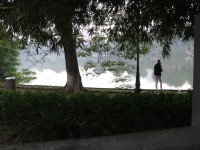It is a joy to be hidden, and a disaster not to be found.
― D.W. Winnicott
I absolutely love the above quotation from one of the most influential people of the last century. Winnicott was a psychoanalyst and a pediatrician whose work with children informed his thinking. Contained in so few words is something so important about what it means to be a human being. Given the poetry in those words, the suggested meanings and resonances, it seems best to approach it through associations.
“A joy to be hidden…”
Something about the private realm. Privacy is such a valuable commodity, no wonder there are efforts socially and politically to protect it. Solitude can be a joyous, sensual experience. Early morning meditation, a crispness in the air, and just the gentle natural sounds (including your own and others breathing) surrounding you. Great joy in moments of being alone with a good book or music playing.
Of course, sometimes being alone can be anything but sweet. There can be terrible loneliness, heart aching and cold. The word “hidden” also applies to experiences when we place something out of the way in order to protect it. Sometimes one’s authentic self (which Winnicott also wrote about) is hidden in order to protect it when conditions do not seem safe and it does not seem welcomed or respected.
“…and a disaster not to be found.”
But we are social animals at heart. We need to be found, we need an other or many others to interact and engage with. We need to be known and understood. To find us is to recognize us, and to be recognized is a salve that soothes the horrible pangs of isolation and loneliness. But more than that, we cannot truly know ourselves without a relationship to help facilitate that knowing. We know ourselves through others.
These central aspects about what it means to be a human being are, of course, central to the process of psychotherapy and psychoanalysis. Every day, I see in my patients the pain of not being able to be alone and the despair at not feeling understood or known. The process of psychotherapy involves a curious mixture of being alone with one’s thoughts in the presence of another and offers the possibility to feel deeply understood and recognized by another human being.
It’s amazing to me that so much of what is so vital to human experience can be contained in so few words. Winnicott was not only a doctor and analyst, but he was a poet as well. In his writings and theories, he captures startlingly clear and at the same time enigmatic and profound truths about human experience. Surely he learned a great deal from those children.


Comments are closed.